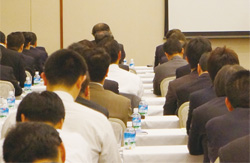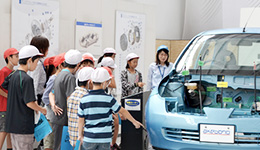Initiatives in Purchasing
Promoting CSR and Green Purchasing
Akebono formulated its Green Purchasing Guidelines in 2005 and revised them in 2011. Under the guidelines, we consider the environment and CSR from the purchasing stage by working together with suppliers to procure materials, components, and secondary materials with low environmental impact. Additionally, we encourage our suppliers to enhance their environmental management performance by promoting activities to obtain external certifications such as ISO 14001.
Ranking and Management of Environmental Impact Substances under Green Purchasing Guidelines
Targeted chemical substances are categorized into three ranks and controlled as follows:
| Rank | Chemical substances | Examples of control measures |
|---|---|---|
| Usage prohibited | Substances that are strictly banned from use and production by law and regulation | Prohibit use/draw up plans for abolishment if there is substance in use |
| Usage restricted | Substances which are projected to come under legal regulation and substances for which emission regulations are set under existing laws | Conduct research on alternative materials or reduction methods and draw up reduction plan |
| Proper management of usage information required | Substances listed in GADSL*1 that is, substances requiring declaration of usage amount | Ensure proper management of usage information and work toward reduction of usage |
- [Green Procurement, Green Purchasing]
Green procurement and green purchasing refers to the preferential selection and acquisition of products that cause the least negative environmental impact. The scope of products covers materials, secondary materials, office supplies and equipment used in the course of manufacturing - [*1 GADSL (Global Automotive Declarable Substance
List)]
A list of chemical substances requiring proper management, formulated by automobile manufacturers, their parts suppliers, and material suppliers in Japan, the United States, and Europe. It targets the following substances, which may be contained in products and materials supplied to automotive manufacturers:- Substances that are subject to regulation under the laws of each country
- Substances that are expected to come under legal regulation
- Substances with a proven negative impact on health and/or the environment
Responsible Resource and Raw Material Procurement
Akebono promotes responsible procurement, including conflict minerals, and we request our business partners to cooperate in investigations conducted in accordance with industry standards. Additionally, we ask for their cooperation to ensure that minerals associated with human rights violations, environmental destruction, and corruption are not used.
- [Conflict Minerals]
Conflict minerals refer to minerals mined in conflict regions and surrounding areas that serve as funding sources for armed groups. Section 1502 of the Dodd-Frank Act targets minerals containing tungsten, tantalum, gold, and tin produced in the Democratic Republic of Congo and neighboring countries.
Supply Chain Safety Promotion
Akebono is actively working to ensure safety across its supply chains, aiming for zero occupational accidents and zero supply disruptions through thorough fire prevention and disaster management. Through supplier meetings held in various regions around the world, we request our business partners to create safe and secure workplaces.
Response to Substances of Very High Concern
In cooperation with our suppliers, Akebono conducts testing on purchased products to determine whether they contain substances of very high concern (SVHC*2) or banned substances. These tests are performed at the individual product level, and their results are communicated to our customers. Furthermore, we are implementing measures to ensure that the labeling of purchased products complies with applicable laws and regulations.
- [*2 SVHC (Substance of Very High Concern)]
SVHC refers to chemical substances that are of significant concern due to their potential to cause serious impacts on human health and the environment. These include substances with a certain level of carcinogenicity, mutagenicity, or reproductive toxicity; substances that are persistent, bioaccumulative, and toxic; substances with very high persistence and bioaccumulation; and substances with endocrine-disrupting properties.
Suppliers' Meetings Held around the World

Akebono holds Suppliers' Meetings to facilitate our business partners gaining a deeper understanding of the Company's initiatives. Through explanations of annual policies and key focus areas, we aim to strengthen their understanding of our activities while fostering efforts to mutually enhance competitiveness.







